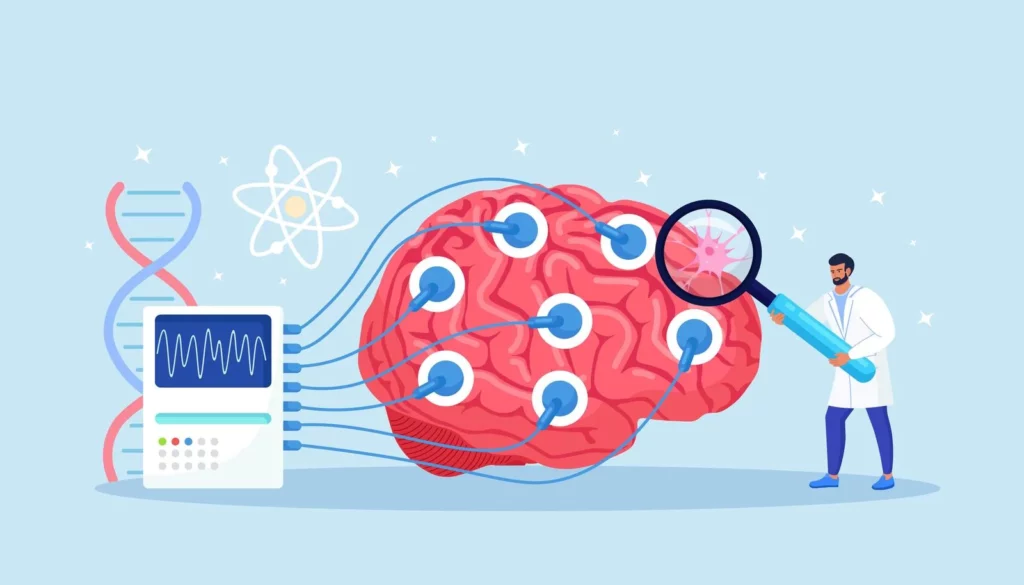This article will help to dispel myths and provide accurate information about TMS side effects, helping you make informed decisions about TMS therapy for mental health conditions.

Transcranial Magnetic Stimulation (TMS) therapy
TMS is a newly popularized form of therapy, approved by the FDA and currently in widespread use for many mental health conditions, including:
- Depression
- Anxiety
- OCD
- Migraines
- Addiction
Transcranial magnetic stimulation places electrodes on either side of the forehead. Magnetic impulses are sent directly into the brain via the top of the head using magnetic stimulation. The intensity of these impulses can be adjusted, as can the location.
Different companies use varying technology. There are even inexpensive devices online and the option of making homemade TMS with batteries. However, professional organizations provide higher-quality technology that can penetrate deeper areas of the brain with more precision to achieve targeted results for mental health conditions.
Common side effects associated with TMS therapy
Anyone considering TMS might worry about side effects. While there are a few, they occur during the first few sessions and only for a small percentage of clients.
Headache
One of the most common side effects of TMS therapy is a slight headache after the first few sessions. However, these tend to go away on their own after individuals have received several sessions. Moreover, many clients who initially suffer from a slight headache can take things like over-the-counter medication preemptively to relieve the pain.
Scalp Discomfort
Other TMS therapy side effects include scalp discomfort. Sometimes, clients feel a slight discomfort at the points where the magnetic impulses are being sent. However, this is subjective, based on individual pain thresholds and sensitivity. It is something that tends to dissipate with regular sessions.
Twitching
Some clients experience mild twitching in the affected areas after sessions. These side effects of TMS are mild at best and go away within a few hours.
Lightheadedness
Lightheadedness is another possible side effect, with clients feeling light-headed throughout the day following the sessions. This, too, is something that can be reduced with additional sessions as the body and brain adjust to the equipment and procedure.
Common misconceptions about TMS side effects
There are several misconceptions about TMS side effects that can hinder people from getting the treatment they need.
Myth: TMS causes severe pain
Many people worry about TMS side effects, mainly whether it causes severe pain. It is a complete myth that you will experience intense pain.
In reality, the only real side effects of TMS that relate to pain might be mild sensations that people feel from the machinery, the magnetic pulses, or several hours after a session. However, the medical professionals who oversee your sessions have complete control over the intensity of the magnetic pulses.
Myth: TMS results in long-lasting discomfort
Similar to the misconception above, many people worry that there can be long-lasting side effects of TMS therapy. What most people describe as pain is really just discomfort, getting used to a new sensation like some mild dizziness or headaches after an initial session.
However, this does not produce long-lasting discomfort. At worst, you can take a small ibuprofen or Tylenol before your sessions or immediately after to help with any initial discomfort. Still, as your body becomes accustomed to the sessions, that discomfort tends to go away such that you won’t experience it for several weeks into your treatment.

Myth: TMS leads to memory problems
Other people worry about TMS side effects interfering with memory. This procedure targets very specific areas of the brain. With our facility, we utilize top-of-the-line proprietary machinery to ensure deeper penetration to particular regions. These areas are not associated with memory and, therefore, do not risk any damage to your memory or any subsequent memory problems.
Note: There can be rare side effects that occur with treatment, including allergic reactions, particularly to the saline solution or other equipment used, and in a few cases, seizures. It is imperative that you work closely with your healthcare provider to mitigate these risks.
Side effects vs. benefits
One of the most important things to keep in mind is that most of the side effects are temporary, meaning they go away after the first few sessions. However, the benefits are significant and can be much more long-lasting, far outweighing any temporary side effects of TMS.
Our treatment really works:
- ⅓ of medication-resistant patients achieved remission, meaning they no longer need medication to manage their conditions
- ¾ of patients received significant clinical response, improving symptoms of their mental health disorder or chronic disorder
Meta-analyses have found it an effective form of depression treatment, anxiety treatment, and a way to target migraines, minimize aggression, and help with substance abuse disorders. While it is acute, with changes sometimes only lasting for one year, additional TMS sessions can be a more viable long-term solution over medication
Practical tips for patients to manage and minimize common side effects
Tip #1
Educate yourself. If you are ever worried about a myth or side effect you read about, check the sources to see if it’s a reputable, scientific journal and, if so, what it has to say about the demographics of those people who experienced side effects and what percentage of them experienced the side effects.
Tip #2
If you are apprehensive, you can manage and minimize common side effects by speaking to our team before your sessions. When you reach out to the professionals who are in charge, they can help you allay any doubts you have in addressing your concerns.
Tip #3
Prepare yourself for your sessions by doing things like taking over-the-counter medication for headaches before you arrive. This can help to thwart the most common side effects. Similarly, if you experience something like lightheadedness or dizziness, schedule your session so that it takes place after work so that lightheadedness doesn’t interfere with the rest of your day.
Summing Up
While there are some TMS therapy side effects, most of them are minimal and don’t affect everyone, and more importantly, are temporary. These temporary side effects are minimized by the significant benefits that can come from TMS, especially for mental health disorders in people for whom home medication is no longer effective.
It is essential to separate fact from fiction when it comes to common side effects and to consult with a qualified healthcare professional to make informed decisions about whether TMS therapy can help you.
